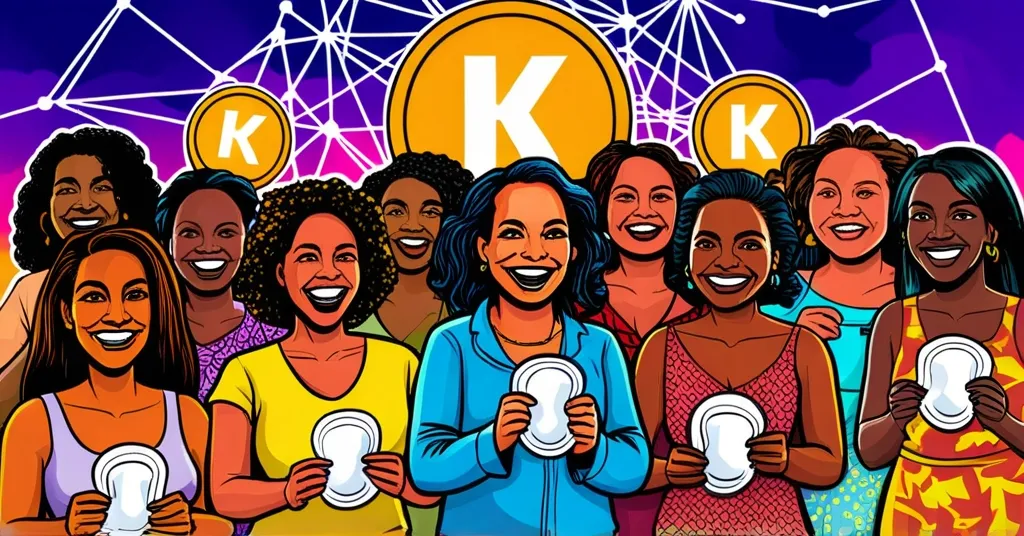KuCoin’s Menstrual Equity Project Aids 4,000 Women in Bahamas – Crypto’s Role in Social Good

KuCoin’s “Menstrual Equity Project” delivers vital menstrual hygiene support to 4,000 women in the Bahamas, highlighting the role of cryptocurrency in addressing global social issues.
- 4,000 women benefit from the latest shipment of menstrual pads.
- KuCoin expands initiative from Suriname and the U.S. to the Bahamas.
- Project aligns with UN Sustainable Development Goals (SDGs).
KuCoin, a leader in the digital economy, extends its reach beyond the financial realm with the “Menstrual Equity Project,” a collaborative effort with the Global CSR Foundation and the American Medical Women’s Association (AMWA). On December 31, 2024, the second batch of aid, consisting of disposable menstrual pads, arrived in the Bahamas, directly aiding 4,000 local women. This initiative is especially significant in a region grappling with water scarcity and the constant threat of natural disasters, where emergency supplies can be a lifeline.
Launched in March 2024, the project initially distributed 1,000 menstrual kits to Suriname, St. Jude Children’s Research Hospital, and domestic violence shelters in New York and California. Each kit included 10 sanitary pads and 2 menstrual cups, aimed at tackling period poverty—a term describing the lack of access to menstrual hygiene products due to financial constraints. The expansion to the Bahamas signifies KuCoin’s commitment not only to advancing digital ledger technology but also to promoting global sustainable development.
Jing Zhao Cesarone, President of the Global CSR Foundation, lauded KuCoin’s efforts, saying,
“KuCoin has set a remarkable example in addressing period poverty in underserved regions, demonstrating its enthusiasm and dedication to social responsibility.”
Nancy Cheung, KuCoin’s Chief Sustainability Officer (CSO), echoed this sentiment, stating,
“As a global leader in the digital economy, KuCoin is committed to advancing the UN’s Sustainable Development Goals (SDGs). Looking ahead, we will continue to focus on key areas such as climate change, health, and education, driving more philanthropic initiatives to fruition. We also plan to expand the scope of the ‘Menstrual Equity Project,’ collaborating with more international organizations to improve women’s living conditions and contribute to global sustainable development.”
The project received endorsement from the Office of the First Lady of the Commonwealth of Bahamas, H. E. Ann Marie Davis, underscoring its national importance. KuCoin’s involvement was first announced at the “KuCoin Green Future Gala” during COP28 in 2023, marking their dedication to social welfare initiatives.
While KuCoin’s efforts in the Bahamas are commendable, it’s vital to consider the broader implications of Corporate Social Responsibility (CSR) initiatives within the cryptocurrency sector. Although disposable menstrual pads address immediate needs, their environmental impact raises concerns about long-term sustainability. KuCoin’s future plans to expand the project and focus on climate change, health, and education indicate a proactive approach that could set a benchmark for other digital economy companies.
However, as we celebrate these achievements, we must remain critical. The crypto world is known for grand promises that sometimes don’t materialize. KuCoin’s commitment to the “Menstrual Equity Project” is a positive step, but it’s crucial they follow through on these promises and maintain transparency in their efforts. In an industry where trust is earned slowly, actions speak louder than press releases.
The project also raises questions about the role of blockchain and cryptocurrency technology beyond financial transactions. Could this be a turning point for the industry, showing that digital ledger technology can also address pressing social issues like period poverty?
While the focus on disposable menstrual pads is necessary given the immediate needs, KuCoin might consider exploring more sustainable solutions like reusable menstrual cups or cloth pads to mitigate environmental impact. The project’s alignment with the UN’s SDGs, specifically SDG 3 (Good Health and Well-being) and SDG 17 (Partnerships for the Goals), showcases the potential for cryptocurrency companies to contribute meaningfully to global efforts.
As we look at the broader cryptocurrency landscape, other companies like Ethereum have also engaged in CSR initiatives, focusing on education and environmental causes. This trend suggests that the digital economy sector might be shifting towards a more socially responsible approach, aligning with the ethos of decentralization and freedom that many in the crypto community champion.
Key Takeaways and Questions:
- What is the goal of the Menstrual Equity Project?
The goal is to provide sustainable menstrual hygiene solutions to marginalized women and girls, aligning with the United Nations’ Sustainable Development Goals (SDGs). - How many women in the Bahamas are benefiting from the latest shipment?
4,000 women in the Bahamas are benefiting from the latest shipment of disposable menstrual pads. - What types of aid were provided in the first phase of the project?
In the first phase, the project distributed 1,000 menstrual kits, each containing 10 sanitary pads and 2 menstrual cups, to Suriname, St. Jude Children’s Research Hospital, and domestic violence shelters in New York and California. - What future plans does KuCoin have for the Menstrual Equity Project?
KuCoin plans to expand the scope of the Menstrual Equity Project and collaborate with more international organizations to improve women’s living conditions and contribute to global sustainable development, with a focus on key areas such as climate change, health, and education. - How does KuCoin’s involvement in this project reflect its broader commitments?
KuCoin’s involvement in the Menstrual Equity Project reflects its broader commitment to social responsibility, announced at the “KuCoin Green Future Gala” during COP28 in 2023, and aligns with its aim to advance the UN’s Sustainable Development Goals.
Initiatives like the “Menstrual Equity Project” remind us that the power of cryptocurrency technology can extend beyond financial transactions to address some of the world’s most pressing social issues. As we applaud these efforts, we must also scrutinize their execution and long-term impact, ensuring that the promise of social good translates into tangible results. And hey, who knew that among blockchain’s many talents, it could also tackle period poverty?



